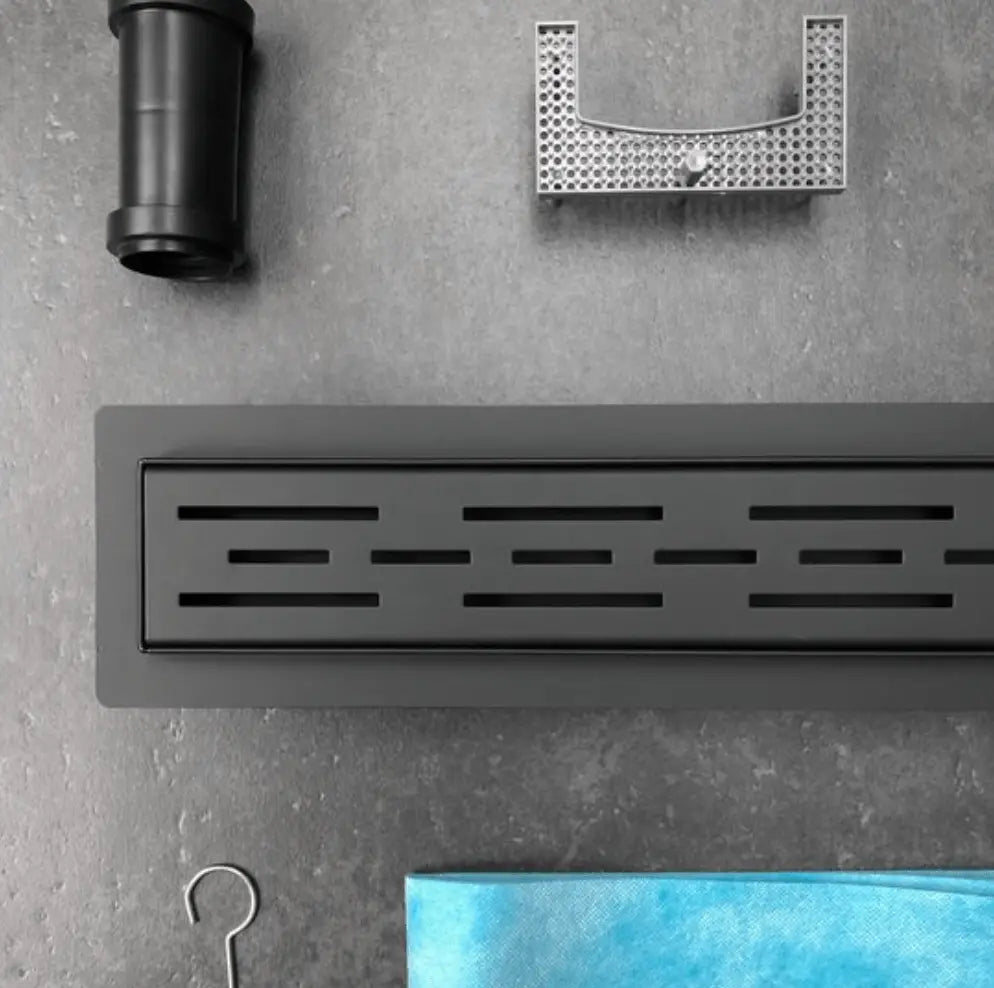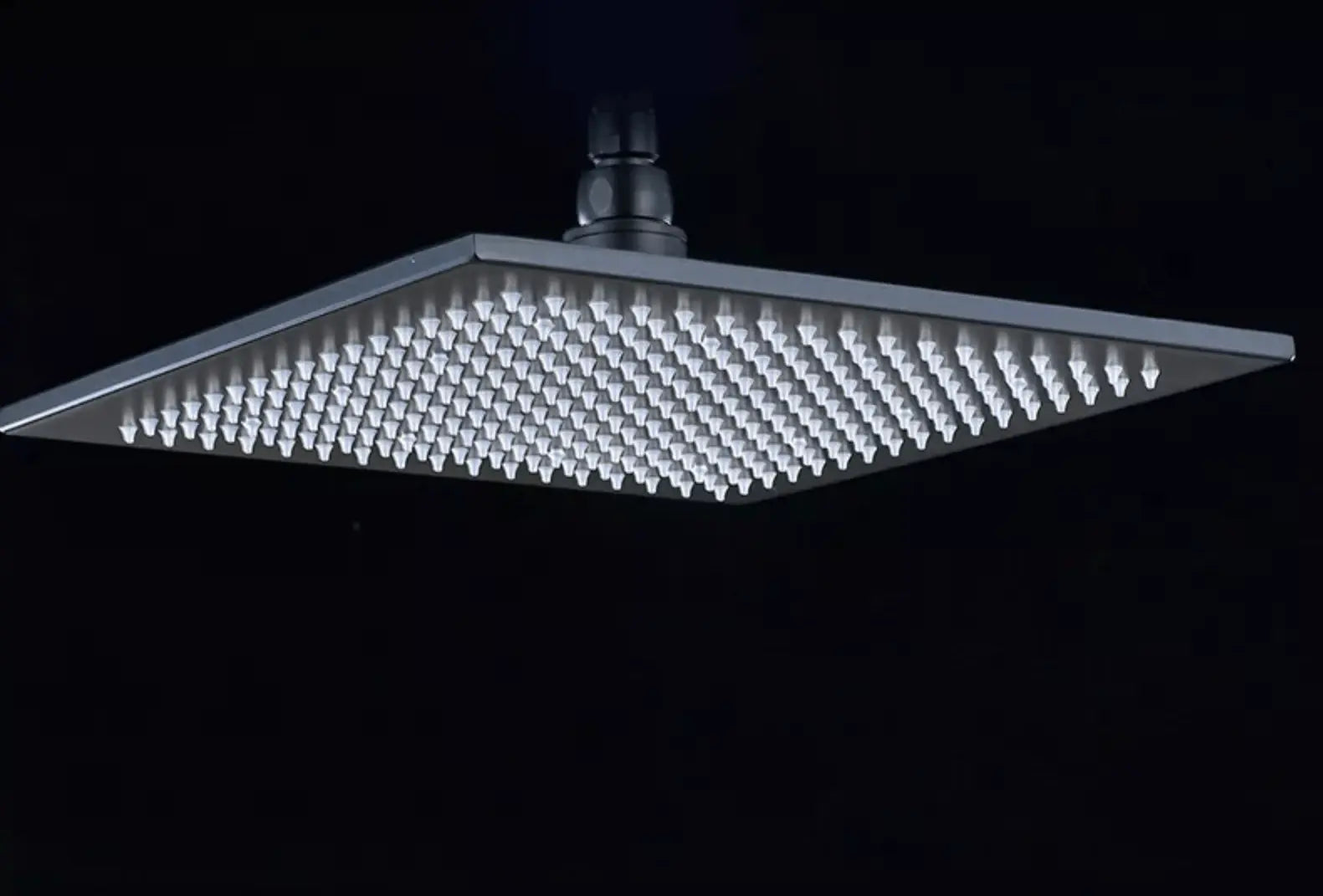
Shower parts
-
SaniSupreme shower extension tube 30 cm round matt black only in combination for Florida shower set
Regular price € 39,00Regular priceUnit price per -
SaniSupreme Creavit Stainless Steel Shower Drain Matt Black with Flange 70 cm - Shower drain removable siphon
Regular price € 89,50Regular priceUnit price per -
SaniSupreme shower extension tube 30 cm chrome only in combination for Florida Shower set
Regular price € 39,00Regular priceUnit price per -
SaniSupreme shower extension tube 40 cm matt black rectangle only in combination for Florida shower set
Regular price € 79,00Regular priceUnit price per -
SaniSupreme extension tube shower 40 cm G1/2 standard connection straight matt black rectangle only in combination shower set
Regular price € 49,00Regular priceUnit price per -
SaniSupreme® Bolivia aluminum wall bar loose matt black (without hand shower and hose)
Regular price € 39,50Regular priceUnit price per -
SaniSupreme LED EcoSave Manhattan square overhead shower rain shower 30 × 30 cm. chrome
Regular price € 179,00Regular priceUnit price per -
SaniSupreme Rain Shower Head Ceiling Matte Black Square 50cm 20 Inch
Regular price € 179,00Regular priceUnit price per -
SaniSupreme LED EcoSave Manhattan square overhead shower rain shower 30 × 30 cm. Matt black
Regular price € 139,50Regular priceUnit price per -
SaniSupreme extension tube shower 30 cm gun metal
Regular price € 49,50Regular priceUnit price per -
SaniSupreme LED EcoSave Manhattan square overhead shower rain shower 25 × 25 cm. Matt black
Regular price € 89,50Regular priceUnit price per -
SaniSupreme Creavit Stainless Steel Shower Drain Matt Black with Flange 80 cm - Shower drain removable siphon
Regular price € 94,50Regular priceUnit price per -
SaniSupreme® Rain shower shower head 10 inch 25 cm. round matt black
Regular price € 49,50Regular priceUnit price per -
SaniSupreme Creavit Shower drain drain T01 Tileable or with Glass grate with Flange 80 cm - Shower drain removable siphon
Regular price € 89,50Regular priceUnit price per -
SaniSupreme shower extension tube 40 cm matt black rectangle only in combination for Florida shower set
Regular price € 79,00Regular priceUnit price per -
SaniSupreme shower extension tube 50 cm matt black only in combination for Florida shower set
Regular price € 59,00Regular priceUnit price per -
SaniSupreme Creavit Stainless Steel Shower Drain Matt Black with Flange 60 cm - Shower drain removable siphon
Regular price € 89,50Regular priceUnit price per -
SaniSupreme Creavit Tileable Grid 80 cm - Stainless steel
Regular price € 37,50Regular priceUnit price per -
SaniSupreme Creavit Black Glass Grid for Shower Drain with Flange 70 cm
Regular price € 51,50Regular priceUnit price per -
SaniSupreme Loose shower arm ceiling, matt black, round, 25 cm. long with rosette
Regular price € 39,50Regular priceUnit price per -
SaniSupreme Creavit Stainless Steel Shower Drain GUNMETAL with Flange 70 cm - Shower drain removable siphon
Regular price € 99,50Regular priceUnit price per -
SaniSupreme Separate mixing unit 3-way Manhattan Premium de Luxe LCD Digital Display matt black built-in
Regular price € 249,00Regular priceUnit price per -
Shower hose SaniSupreme® matt black - 150 cm. long
Regular price € 19,95Regular priceUnit price per -
SaniSupreme® Rain shower shower head 12 inches round matte black
Regular price € 79,50Regular priceUnit price per -
SaniSupreme Rain shower head Head shower matt black square 30 cm 12 inch
Regular price € 89,50Regular priceUnit price per -
SaniSupreme Creavit Stainless Steel Shower Drain GOLD BRUSH with Flange 70 cm - Shower drain removable siphon
Regular price € 99,50Regular priceUnit price per -
SaniSupreme Creavit Stainless Steel Shower Drain Stainless Steel with Flange 80 cm - Shower drain removable siphon
Regular price € 79,50Regular priceUnit price per -
SaniSupreme BlackLine Aloni Rain shower head Overhead shower |matte black| square| 40cm | 16 inches
Regular price € 88,00Regular priceUnit price per -
SaniSupreme Creavit Stainless Steel Shower Drain GOLD BRUSH with Flange 80 cm - Shower drain removable siphon
Regular price € 109,50Regular priceUnit price per -
SaniSupreme Creavit Stainless Steel Shower Drain Matt Black with Flange 100 cm - Shower drain removable siphon
Regular price € 129,50Regular priceUnit price per -
SaniSupreme Creavit Black Glass Grid for Shower Drain with Flange 60 cm
Regular price € 49,50Regular priceUnit price per -
SaniSupreme Creavit Black Glass Grid for Shower Drain with Flange 100 cm
Regular price € 59,50Regular priceUnit price per -
SaniSupreme Creavit Stainless Steel Shower Drain Stainless Steel with Flange 70 cm - Shower drain removable siphon
Regular price € 69,50Regular priceUnit price per -
SaniSupreme BlackLine Aloni Rain shower head Overhead shower |matte black| square| 40cm | 16 inches
Regular price € 88,00Regular priceUnit price per -
SaniSupreme® SmartPulse LED Ceiling Rain Shower Plateau Alicante 60 cm square matt black
Regular price € 389,00Regular priceUnit price per -
SaniSupreme Creavit Stainless Steel Shower Drain GOLD BRUSH with Flange 90 cm - Shower drain removable siphon
Regular price € 129,50Regular priceUnit price per -
SaniSupreme Creavit Shower drain drain T01 Tileable or with Glass grate with Flange 90 cm - Shower drain removable siphon
Regular price € 98,50Regular priceUnit price per -
SaniSupreme Creavit Shower drain drain T01 Tileable or with Glass grate with Flange 70 cm - Shower drain removable siphon
Regular price € 79,50Regular priceUnit price per -
SaniSupreme Creavit Shower drain drain T01 Tileable or with Glass grate with Flange 60 cm - Shower drain removable siphon
Regular price € 68,50Regular priceUnit price per -
SaniSupreme Creavit Black Glass Grid for Shower Drain with Flange 80 cm
Regular price € 53,50Regular priceUnit price per -
SaniSupreme® Rain shower shower head 8 inches 20 cm. round matt black
Regular price € 39,50Regular priceUnit price per -
SaniSupreme LED EcoSave Manhattan square overhead shower rain shower 30 × 30 cm. Matt black
Regular price € 139,00Regular priceUnit price per -
SaniSupreme BlackLine Aloni Rain shower head Overhead shower |matte black| square| 40cm | 16 inches
Regular price € 88,00Regular priceUnit price per -
SaniSupreme Creavit Tileable Grid 60 cm - Stainless steel
Regular price € 29,50Regular priceUnit price per -
SaniSupreme Rain Shower Head XXL | chrome | round | 40 cm
Regular price € 99,50Regular priceUnit price per€ 189,00Sale price € 99,50Sale -
SaniSupreme® SmartPulse Ceiling Rain Shower Plateau Alicante 50 cm square chrome glossy
Regular price € 179,00Regular priceUnit price per -
SaniSupreme® Rain shower head 40 cm round matte black
Regular price € 99,50Regular priceUnit price per -
SaniSupreme Creavit Stainless Steel Shower Drain COPPER BRUSH with Flange 70 cm - Shower drain removable siphon
Regular price € 99,50Regular priceUnit price per -
SaniSupreme Creavit Stainless Steel Shower Drain COPPER BRUSH with Flange 80 cm - Shower drain removable siphon
Regular price € 109,50Regular priceUnit price per -
SaniSupreme Creavit Stainless Steel Shower Drain GUNMETAL with Flange 90 cm - Shower drain removable siphon
Regular price € 119,50Regular priceUnit price per -
SaniSupreme Safe Series Bath & Tap Thermometer with water flow LED chrome
Regular price € 49,50Regular priceUnit price per -
SaniSupreme Creavit Shower drain drain T01 Tileable or with Glass Grid with Flange 100 cm - Shower drain removable siphon
Regular price € 109,50Regular priceUnit price per -
SaniSupreme Black Flat Shower Drain with Flange 60 cm - Variable swivel spout
Regular price € 97,50Regular priceUnit price per -
SaniSupreme Creavit Stainless Steel Shower Drain Stainless Steel with Flange 100 cm - Shower drain removable siphon
Regular price € 109,50Regular priceUnit price per -
SaniSupreme Creavit Stainless Steel Shower Drain Matt Black with Flange 90 cm - Shower drain removable siphon
Regular price € 109,50Regular priceUnit price per

























































